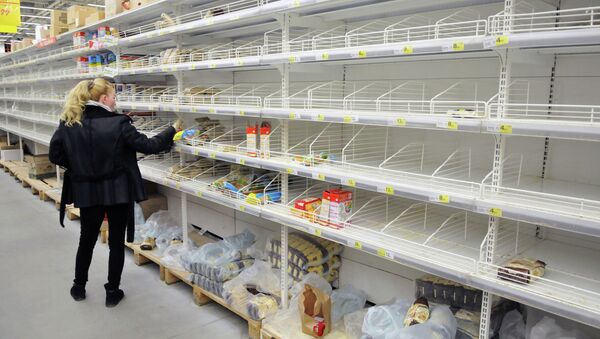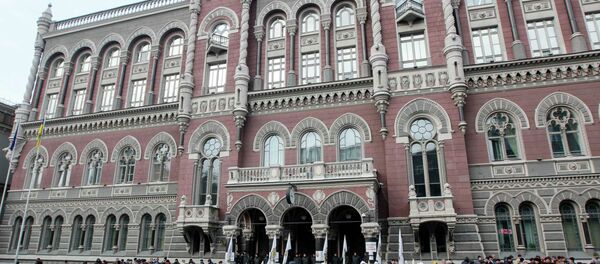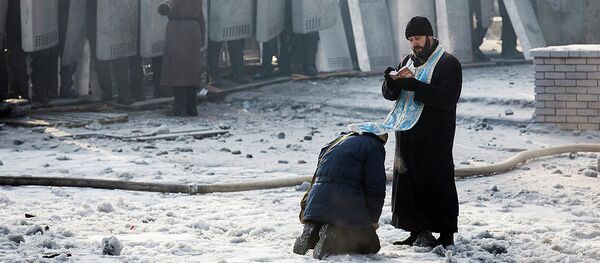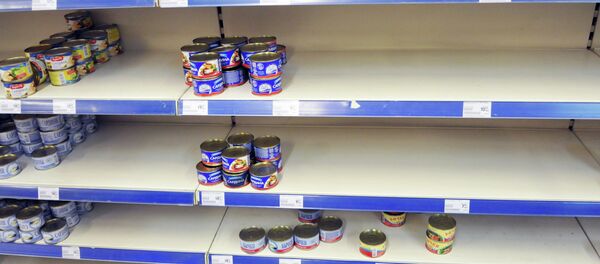Although the study explains disconnects in Ukrainian statistics, there are more reasons to use the Zimbabwe methodology than just high inflation, as Ukraine enacts more measures to pursue the same path.
1. The Government Pursues a 'Redistribution of Property'
On Tuesday, Ukraine's National Bank hiked interest rates for banks to 30 percent, following the bankruptcy of the country's fourth-biggest bank, as almost 40 banks have collapsed since 2014. On February 25, Poroshenko Bloc Verkhovna Rada deputy Vadim Denisenko explained the national bank's policy as a "redistribution of property."
"The National Bank's course, put in place by Hontareva means that in the medium run, there will be no more than 20 banks left in Ukraine."
By comparison, there were almost 200 banks in Ukraine in the beginning of 2014, meaning an aimed at 90 percent reduction. The policy, together with a new law enacted on Monday, which makes bank owners personally responsible for bank failure, allows the state to seize bank owners' assets to repay creditors.
2. By Pushing Banks to Collapse While Bailing Out Favored Oligarchs
The loan was its second bailout in 2 days, and Privatbank was the country's biggest recipient of government aid in 2014.
3….And Linking its Currency Directly to How Many Banks Collapse
According to a list of measures, announced by the Ukrainian National Bank on Tuesday, it plans to stabilize the money supply by "absorbing excess liquidity" of banks, and increasing loans to the deposit insurance funds.
"A considerable part of the increase of the money supply will be done through giving additional loans to the Deposit Insurance Fund."
This means that the National Bank will print money each time a bank collapses to pay its depositors, and expect the remaining banks to repay the loans at 30%, likely causing even more banks to collapse.
4. It Decided to Impose Austerity in Exchange for IMF Loans
Although wages grew in step with inflation immediately after the coup, with wages in education and healthcare peaking in June, IMF loan conditions forced the government to restrict social spending. As a result, educators received an average pay cut of 25% while healthcare workers received an average 8.7 percent cut, not including layoffs.
5….And Got Hyperinflation in a Perfect Storm of Financial Collapse, Currency Failure and Mass Impoverishment
The trend was compounded with a collapse of exports from both industries which saw their subsidies cut as part of the IMF deal, and agriculture, which suffered as food prices fell, almost halving export revenues, according to Hontareva.
"Compared to January-February 2014, the [fall in export revenue] has grown to 45 percent," Hontareva declared on Monday.
The Ukrainian government previously encouraged agricultural producers to export more food to improve the country's trade balance, and the move caused internal prices for grains and vegetables to rise 90% in 2014, officially. At the same time, a decrease in real wages across the board led people to buy cheaper domestic foods over meat and more expensive imported foods.
The only real difference between Ukraine and Zimbabwe in all of this, is that Zimbabwe tried to redistribute land from the poor to the rich, while Ukraine redistributes property from the rich to the very rich.









